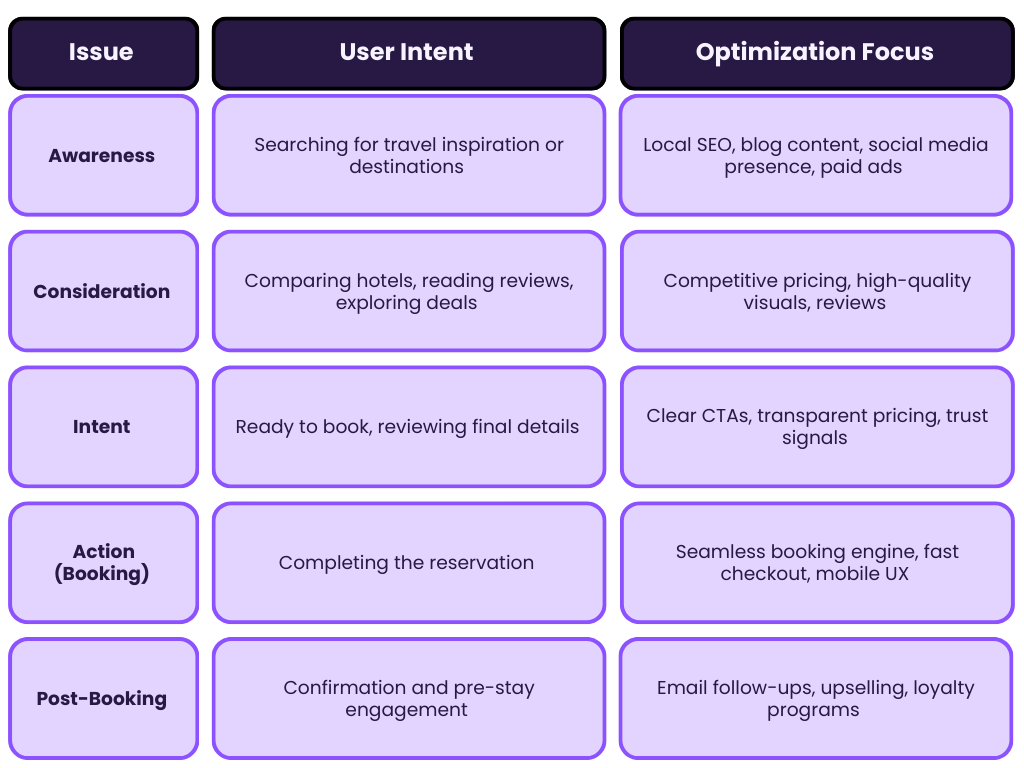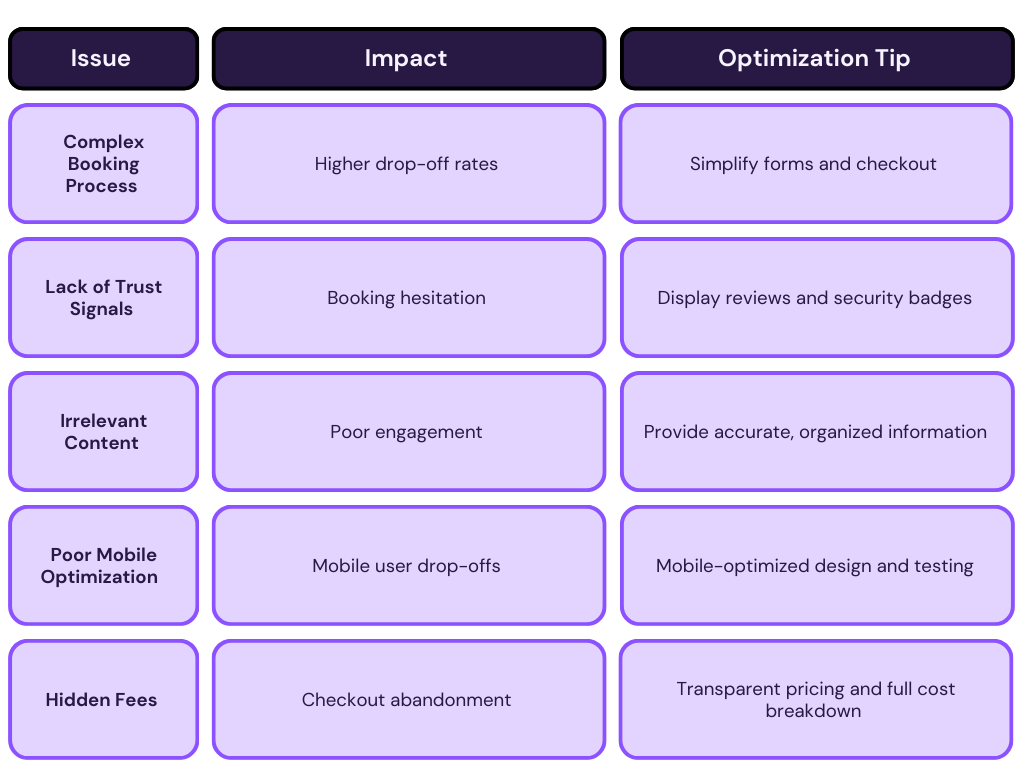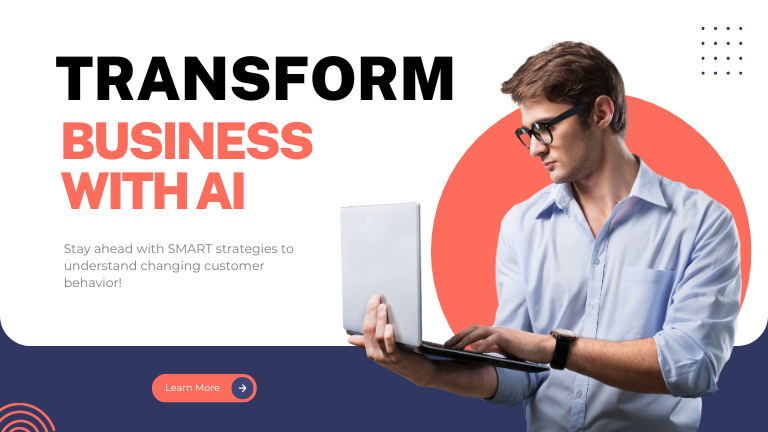Simply attracting visitors to your hotel’s website isn’t enough to secure bookings. With 36% of travelers now starting their hotel search via search engines—up from 26% in 2024—hotels must focus on more than just visibility, according to SiteMinder’s report. Attracting visitors to your hotel’s website is just the first step. To secure bookings, it’s essential to optimize the conversion funnel, transforming curious browsers into confirmed guests.
This blog explores the most effective strategies, common pitfalls, and practical enhancements to boost your hotel’s conversion performance.
Understanding the Hotel Conversion Funnel
The hotel conversion funnel outlines the path a potential guest follows from initial awareness to final booking. Understanding this funnel is crucial for identifying where drop-offs occur and how to guide visitors smoothly toward conversion.
Stages of the Hotel Conversion Funnel

Quick Tips:
Top of Funnel: Develop effective content and PPC marketing strategy for ads to attract.
Mid Funnel: Showcase USPs, reviews, and promotions.
Bottom Funnel: Simplify booking; add urgency triggers.
Post-Booking: Engage via personalized emails and upsells.
Core Strategies for Hotel Conversion Optimization
To convert more website visitors into confirmed guests, hotels must implement targeted digital marketing strategies. Below are proven, high-impact hotel conversion optimization tactics that enhance user experience and drive bookings.
Streamline the Booking Process
A frictionless booking process is the cornerstone of high conversion rates. Complex forms or unclear steps can deter guests, with studies showing that 18% of users abandon bookings due to lengthy processes (Baymard Institute).
Key tactics:
- Minimize friction by reducing the number of steps to complete a booking.
- Use clear, action-oriented CTAs (“Book Now,” “Reserve Your Stay”).
- Ensure mobile responsiveness for seamless booking on any device.
- Offer real-time availability and instant confirmation to build trust.
Crafting High-Converting Landing Pages
A well-designed landing page aligns with specific marketing campaigns (e.g., “Summer Getaway Deals”) and guides visitors toward booking.
Key Tactics for Developing Landing Pages:
Targeted Landing Pages: Create separate pages for different campaigns (e.g., “Summer Getaway Deals” or “Romantic Getaways”) to cater to specific audiences.
Compelling Headlines: Use headlines like “Book Your Summer Getaway and Save 20%” to clearly communicate value.
Focused Content: Minimize distractions by limiting links and keeping the call-to-action (e.g., “Book Now”) prominent.
A/B Testing: Test elements like images, text, and buttons to optimize performance. For example, compare variations with different images (hotel room vs. local attractions) to see which drives more bookings.
For instance, let’s say a hotel tested two headlines for a “Winter Escape Deals” campaign:
Headline A: “Save 30% on Your Winter Vacation” (15% more conversions).
Headline B: “Exclusive Winter Discounts – Plan Your Dream Holiday” (lower conversion). Headline A performed better by emphasizing savings.
Tailored landing pages significantly boost bookings by:
Personalized Experience: By targeting specific audiences (e.g., families, couples), the message resonates more, increasing engagement and conversion rates.
Clear Value Proposition: Customizing headlines and offers (e.g., “Save 20% on Summer Getaways”) highlights immediate benefits, making visitors more likely to take action.
Focused Content: Reducing distractions (e.g., fewer links) keeps the visitor’s attention on booking, improving the likelihood of conversion.
Improved User Experience: Tailored content increases trust and relevance, making visitors feel their needs are understood, thus encouraging them to complete the booking process.
Real-World Proof: MainStreet Case Study
A great example comes from Woosper’s work with MainStreet. It showcases the power of niche targeted landing pages. By creating unique landing pages for each city and apartment location, combined with geo-fencing display campaigns, they achieved significant results:
- 9.31% Click-to-conversion rate (up from 0.83%).
- Reduced cost per click to $0.44.
- 1,689 conversions were generated, including 137 valuable phone calls.
This case illustrates how customized landing pages, along with targeted campaigns, can drastically increase conversions and reduce ad costs.
Leverage High-Quality Visual Content
Images influence booking decisions more than text.
What to Focus On:
- Professionally shot images of rooms, amenities, and local attractions.
- Highlight unique features, like a rooftop pool or on-site dining, in 15–30 seconds through short videos.
- 360° tours or videos for immersive experiences.
- Alt text for SEO and accessibility.
Pro Tip: Recommend compressing images for faster load times and using descriptive alt text for SEO.
Website Design and User Experience (UX)
Your website should feel intuitive, effortless, and designed with the mobile user in mind. Prioritize responsive design and website speed on mobile devices to reduce bounce rates and keep visitors engaged. A seamless, user-friendly experience increases the likelihood of conversions by keeping users focused on their goal—booking a stay—with clear, easy access to room options, pricing, and availability.
Use a clean, modern layout that reflects your hotel’s style and tone, ensuring it adapts beautifully across all devices. Incorporate persistent booking options, like sticky headers or floating booking widgets, so guests can reserve a room from anywhere on the site without backtracking.
Regular user testing is essential. Conduct frequent usability tests to identify and resolve navigation issues, ensuring every visitor has a smooth, frustration-free journey from homepage to confirmation page.
Tips:
- Compress image sizes
- Minimize scripts and redirects
- Use a reliable hosting provider
- Implement caching and CDNs
Trust Signals and Social Proof
Before making a decision, guests seek reassurance. Displaying credibility markers can alleviate concerns about security or quality.
Effective trust signals include:
- Real guest reviews and ratings
- Clear cancellation and refund policies
- Visible customer support contact
- Security badges for payment processing
Create Urgency and Incentives
Urgency and incentives motivate guests to act quickly, reducing the likelihood of them shopping around. Create urgency but avoid sounding pushy—balance is key.
Proven tactics include:
- Create fear of missing out (FOMO) with limited-time deals, countdown timers, or low-availability alerts.
- Offer exclusive perks for direct bookings (e.g., discounts, upgrades, free breakfast).
- Display seasonal offers and highlight booking deadlines.
- Use pop-ups or banners to promote flash sales or last-minute deals.
Personalization & Targeting
Today’s guests expect tailored experiences that cater to their preferences. Personalization can increase conversions by making your offerings feel relevant and exclusive.
Tips:
- Recommend rooms or packages based on user behavior and past visits.
- Geo-target offers and content by region or language.
- Automate email follow-ups for cart abandoners and repeat guests.
- Retarget users with personalized ads across platforms.
- Consider partnering with PPC advertising services for expert and professional help.
Leveraging Data to Drive Conversions
When used effectively, data-driven analysis can reveal booking barriers, optimize campaign performance, and strengthen lead generation.
Track the Metrics That Matter
Data empowers hotels to identify booking barriers, personalize user experiences, and improve conversion performance. Key metrics to monitor:

Use Reliable Analytical Tools
Leverage platforms like:
- Google Analytics for traffic and behavior analysis
- Booking engine reports for conversion trends
- Heatmaps to understand user interactions
Run Controlled A/B Tests
Test one change at a time—such as CTA placement or headline copy—to understand what drives better results. Small changes can yield significant improvements.
Apply Data to Personalize the Experience
Use behavioral history and demographics to:
- Recommend relevant rooms or packages
- Serve location-specific offers
- Adjust messaging by user type
Review and Refine Regularly
Finally, ongoing monitoring ensures strategies remain effective. Adapt based on findings and repeat the cycle to maintain optimal performance and improve long-term results.
Overcoming Common Conversion Killers
Even a well-designed hotel website optimization can lose bookings if key user experience issues go unaddressed. Below are five common conversion blockers and actionable solutions to resolve them effectively.

Solving these pain points improves not just conversion rates, but also the overall guest perception of your brand. The key is to make bookings fast, trustworthy, and user-centric.
The Role of Post-Booking Optimization
The customer’s journey does not end with a confirmed reservation. In fact, what happens after the booking plays a crucial role in shaping guest satisfaction, loyalty, and repeat business.
- Confirmation Emails
Send prompt, well-designed confirmation emails that clearly outline reservation details, cancellation policies, and contact information. This builds trust and sets clear expectations.
- Personalized Communication
Tailor your messaging based on guest profiles. Suggest room upgrades, spa treatments, or dining reservations aligned with their preferences or past behavior.
- Engagement Before Arrival
Keep guests engaged by sharing helpful content in the days leading up to their stay. This may include local recommendations, event calendars, or weather updates relevant to their trip.
- Incentivize Repeat Business
Offer loyalty rewards, exclusive promo codes, or personalized discounts on future stays. Guests are more likely to return if they feel valued beyond the first visit.
- Request Feedback
Follow up post-stay with a brief, respectful feedback request. Use this input to improve services and show guests that their opinions matter.
Wrapping Up
As traveler behavior evolves, a data-driven approach to hotel conversion optimization ensures you meet customers where they are, with the clarity, trust, and convenience they expect. From streamlined booking processes to personalized engagement, each tactic outlined in this blog offers a pathway to higher conversions.
At Woosper, we help hotels like yours master the art of conversion optimization. With the right tools, insights, and commitment to guest-centric design, your hotel can convert more lookers into loyal bookers. Contact our experts for a personalized consultation today.
FAQ
How to increase hotel direct booking?
Optimize your website for mobile, offer exclusive perks for direct bookings, use retargeting ads, and invest in SEO and PPC campaigns to drive and retain traffic.
How to optimize hotel revenue?
Implement dynamic pricing, reduce booking abandonment, and personalize offers based on guest behavior and booking patterns to maximize per-customer revenue.
How to boost hotel sales?
Leverage targeted marketing, loyalty programs, seasonal promotions, and high-quality visuals. Streamline booking and use data insights to enhance guest experience and drive more sales.
How to attract hotel customers?
Use compelling content, local SEO, and social media to reach travelers. Showcase your USPs and guest reviews, and run ads to target specific demographics or travel intents.










